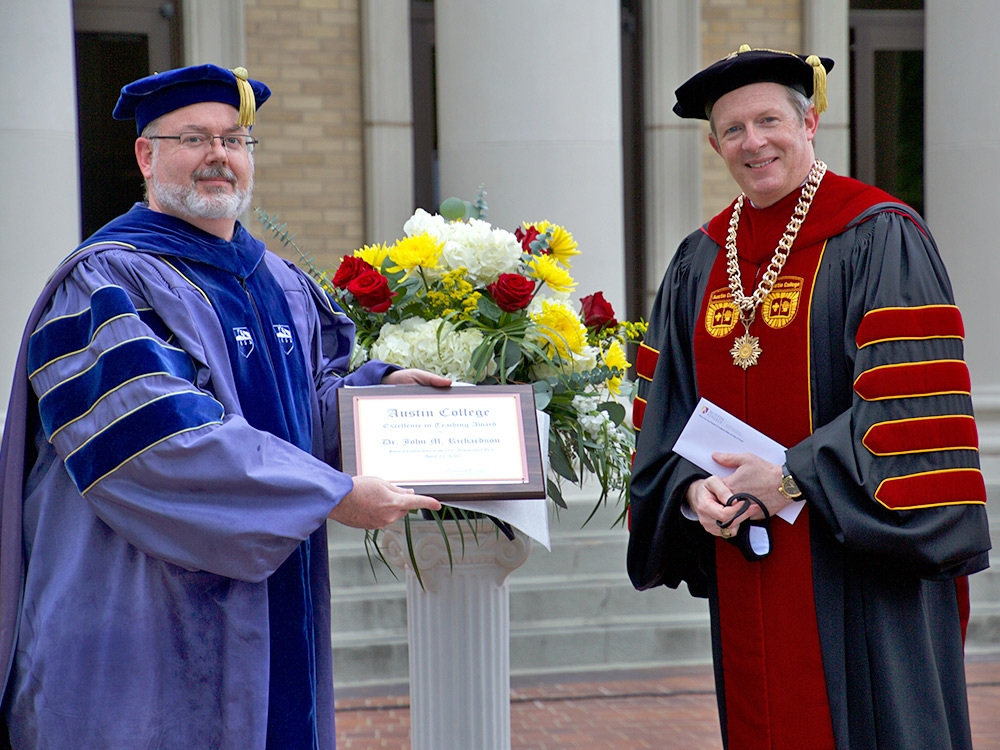 Dr. John Richardson received Austin College’s 2021 Excellence in Teaching and Campus Leadership Award at Honors Convocation in April.
Dr. John Richardson received Austin College’s 2021 Excellence in Teaching and Campus Leadership Award at Honors Convocation in April.
A member of the science faculty since 2008, Richardson was named professor of biochemistry in 2020. That year, he also was installed as the Richardson Chair for the STEM Teaching and Research Leadership Program, a program he helped to establish over the last several years.
“I thrive on meeting young intellectuals where they are in their educational journey,” said Richardson, “and seeing their potential and believing in their ability to succeed, even when they cannot see it for themselves. As faculty, we are daring students to embrace their natural curiosity.”
One of the key aspects of learning is the desire to understand, Richardson continued. “The role of the instructor is to facilitate and nurture this desire, and in doing so, cultivate the further interests of the students. In the classroom, students must be inspired to learn, not for the sake of simply having memorized facts and figures, but to develop the tools necessary to comprehend, critically analyze, and direct future studies. These tools will serve the students not only in science but also in the day-to-day business of their life. To be inspired, students must feel a sense of ownership of the knowledge they have acquired. I strive to instill this ownership of knowledge through the incorporation of primary scientific literature, historic publications, current events, active learning, and popular culture into the course curriculum.”
With primary teaching responsibilities of “Introductory Chemistry,” “Biochemistry,” and “Biochemical Metabolism,” Richardson specifically chose to set up research with undergraduates. He believes getting students involved in authentic research at an early stage is critical to cultivating the next generation of critically thinking scientists and physicians who will lead society through the new millennium.
Richardson seeks to incorporate newer teaching elements into his classroom, from flipped classrooms in his freshman courses to using Course-based Undergraduate Research Experiences (CURE) to create hypothesis-driven research opportunities rather than what some would call “rote” labs in which the experiments have been done before and the conclusions are known. He also incorporates interactive PowerPoints, voice recordings, and electronic grading.
His popular January Term course, “Molecular Gastronomy,” explores the molecules that make up food and their properties. Discussion and lecture are supplemented with video clips from the Food Network show Good Eats, a thematic cooking program that explores traditional recipes with a scientific understanding of the transformations occurring. Students are given instructions to create two experiments: one on the sensation of smell and taste, and the other to test a family cooking tradition.
In addition to teaching and research, Richardson is the advisor of Austin College’s chapter of Alpha Phi Omega national co-ed service fraternity.
Austin College, a private national liberal arts college located north of Dallas in Sherman, Texas, has earned a reputation for excellence in academic preparation, international study, pre-professional foundations, leadership development, committed faculty, and hands-on, adventurous learning opportunities. One of 40 schools profiled in Loren Pope’s influential book Colleges That Change Lives, Austin College boasts a welcoming community that embraces diversity and individuality, with more than 50 percent of students identifying as persons of color. The residential student body of approximately 1,300 students and more than 100 expert faculty members allow a 13:1 student-faculty ratio and personalized attention. Related by covenant to the Presbyterian Church (USA), Austin College cultivates an inclusive atmosphere that supports students’ faith journeys regardless of religious tradition. The College, founded in 1849, is the oldest institution of higher education in Texas operating under its original name and charter.



